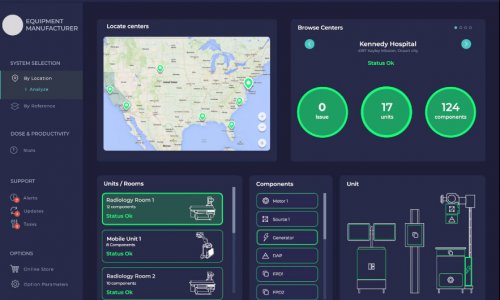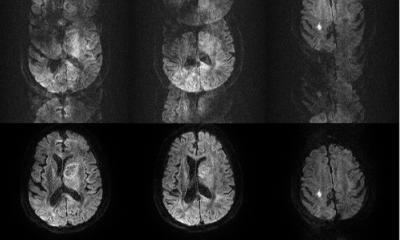
News • Consumer Electronic Show
Blockchain, Blue Button and interoperability among hot topics at CES 2018
Health data sharing, telemedicine, even federal value-based payment plans were all part of the excitement at the Consumer Electronics Show in Las Vegas.
The tech world descended upon Las Vegas this week for the annual Consumer Electronics Show, and plenty of health IT’s biggest players were in attendance. While much of the discussion was on consumer-friendly health tools and novel digital interventions, there were still a handful of products and discussions between executives and entrepreneurs focused on healthcare’s largest roadblocks — namely, data management and analytics. “Everyone loves playing in their own sandbox. How does it get to the point of sharing that data? How do we have EMRs being shared across systems today?” Pat Keran, VP of innovation and R&D at Optum Technologies, said during a roundtable discussion at CES’ Digital Health Summit. “I think data sharing is first and foremost, but even for the data that we have, how do we effectively analyze that today? How do we use artificial intelligence, deep learning, those types of things that are starting to evolve right now into being a lot more effective for where we’re at today?”
I think we have to be able to trust and put data with people and make sure that you do it in a way that is scalable and gives them just enough information
Stefani Benefield
With more continuous sensors entering care, a rising challenge is separating the useful data from noise and extracting actionable insights. While most speakers focused on how to address these issues in the consumer space, others highlighted the gaps that health systems and insurers still have to address. “We really need to start thinking about the caregiver. Until we get all the data integrated and all the interoperability and everything, there are people in the lives of every patient you serve, already there,” Stefani Benefield, VP of health innovation at Humana, said during the same session. “Make sure that the data can somehow get to them … you may not be able to get it into one beautiful care plan yet, and I think we would all love that, but I think we have to be able to trust and put data with people and make sure that you do it in a way that is scalable and gives them just enough information. I actually think [the insight is] there, we just need to get it to the right people.”
Interoperability, blockchain remain key focuses
While Benefield and Keran were primarily focused on how to use healthcare data as it is today, there were other speakers looking more toward the future. QuHarrison Terry, director of marketing at Redox and a recent entrant into the world of healthcare data, said that he was baffled by the status quo of siloed data and the reliance on fax machines for medical data transfer. While pitching his company’s platform — a vendor-agnostic API currently employed by hundreds of health companies — he said that these interoperability hurdles need to become a key focus for the industry.
Bettina Experton, MD, CEO of Humetrix, described her company’s work with government agencies over the past decade to develop a mobile implementation of the Blue Button initiative, iBlueButton. Interest in the program has led Humetrix to successfully extend its efforts to the national healthcare systems of the UK and France, she said, though roadblocks are continuing to pile up in the world’s largest healthcare market. “Back in the US, we had a frustration. We turned medical data into a logical health record for all for your smartphone — that was President Bush in 2004, but it has not quite happened today,” she said during a presentation. “For years we asked CMS to give us an API to make it really easy and sturdy in terms of access to that data for patients to use, so CMS finally responded to the call and this administration, embracing that innovation, is building an API … and we are one of the industry players who are testing that API.” At the end of her talk, Experton also hinted at new announcements related to their work with CMS’ API to be announced at HIMSS 2018.
Still, it wouldn’t be a tech conference without some mention of blockchain. During a fireside chat on the trending technology, Mike Jacobs, senior distinguished engineer with Optum Health, and Jaquie Finn, head of digital health at Cambridge Consultants, both said that they were generally optimistic about blockchain’s role in healthcare, but warned that it should only be applied to tasks in which it is well suited. “[When my clients are making a smart connected device,] if there are three conditions I can see present in the scenario around the data, I will think about blockchain maybe happening: If the data is dynamic; if the current solution that they are going to have is fragmented,; and if there is a suspicion of malicious activity,” Finn said. “Those three things are like a red flag, where we could talk about when designing the system to add some blockchain technology, simply to protect the data.”
Finn said the best applications of the technology she has seen so far in healthcare are those designed to track and prevent the sale of counterfeit drugs and devices. Jacobs — who cryptically noted that Optum “will take a leadership role” in the future of blockchain and healthcare — outlined his own ideas about where blockchain is most likely to make impact, among which were smart, legally-binding automated contracts for payments, and the transfer of health records. “Today in the healthcare world we have islands of information where there’s high costs and reconcilable differences in the islands, [and] a central, stable source of truth makes sense without necessarily having a central authority,” he said. “Those are the big ideas, and we’re pretty excited.”
Source: HIMSS/Dave Muoio
16.01.2018





